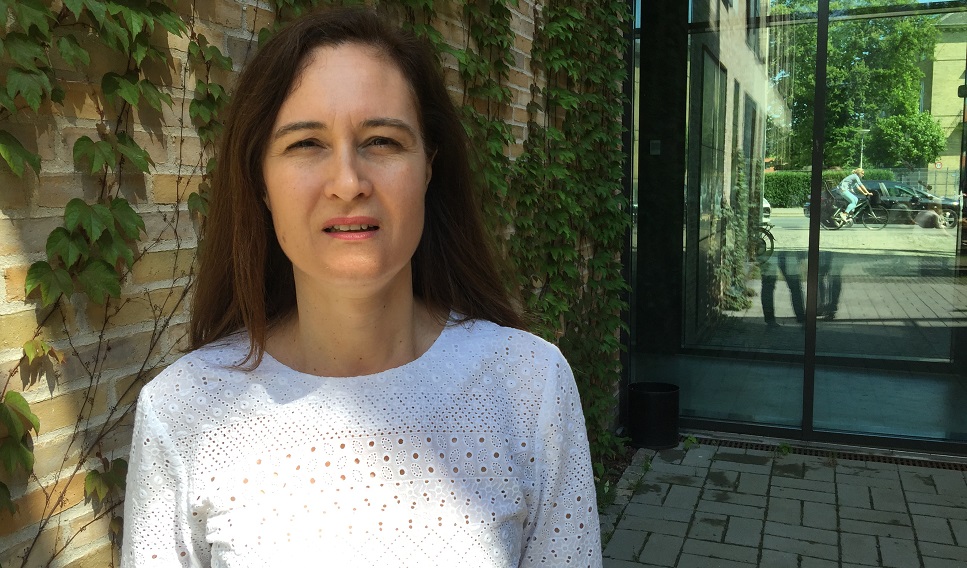New Professor in Dairy Process Technology
Lilia Ahrné has since 1 April been a full professor at the University of Copenhagen’s Department of Food Science. In this interview she shares her thoughts on the position and the areas she will focus on. For example mild processing, functionalized dairy ingredients and structure processing.

Professor Lilia Ahrné. Picture: Lene H. Koss
What is your vision as a new professor of dairy process technology?
My vision is to develop a long-term platform to deliver high quality research and skilled personnel resources to support the development of innovative and sustainable processing solutions for manufacturing of high quality, healthy and natural dairy products.
The abolishment of dairy quotas makes it possible to increase export to world markets, which requires development of products with longer shelf-life or for ambient storage. On the other hand, the market in Europe is changing to more sustainable and personalised foods that require small-scale production or shorter food chains. These are just two challenges being faced by the dairy industry that require development of new products and technologies and I hope our team will contribute.
My goal, in close collaboration with industry and my colleagues at the University of Copenhagen, is to create many interesting projects that will attract students and also contribute to the development of dairy technology in Denmark.
Could you describe the core areas that you are dealing with?
The core areas will be mild processing, functionalised dairy ingredients and structure processing. I would like to explore technologies that are emerging or under development, that are sustainable and that can produce added value dairy products. The effect of technologies on product properties like texture, taste and nutritional value is a major interest of my research – especially the development of more healthy and tasty alternatives. Can healthy food taste good? Yes, it is possible. In my previous job I worked with a client to develop a doughnut that has 40% less fat and that, according to 75% of consumers asked, tastes better than regular doughnuts. This is the type of output I would like to generate.
It is also important to select technologies that can keep the naturalness of raw materials or improve their properties. In addition, there are a number of traditional processes, for example, spray drying, that are still not fully understood, especially in terms of a holistic approach towards the relationships between raw materials/formulation, processing and relevant product properties. In my view traditional processing technologies and chains need to be re-evaluated using new tools available and driven by consumer needs for transparency and local produced products.
I am also exploring the possibility of new courses, to help students interested in development of more healthy, tasty and sustainable foods.
There are relatively few groups working exclusively with dairy process technology and fewer still focused on food technology/engineering in general. It has become difficult in recent years to find people that have knowledge of both engineering and food. Many chemical engineering students lack knowledge about food and many food science students lack knowledge about technology/engineering. This is the gap that we want to fill. I have many years’ experience of developing innovative processes and a well-established network in Europe that we would like to explore to create a team that can contribute in this area.
What are your most important tasks right now?
My main task now is to define the research projects for 2 postdocs/senior researchers and 2 PhDs. I would like to form a team that works in close collaboration with industry so that we can develop relevant research and create capacity in the area.
Topics
Related News
Invitation
Lilia Ahrné will deliver her inaugural lecture entitled ‘Challenges and Opportunities in Dairy Process Technology’ on Wednesday 29 June 2016 at 1 p.m. in A2-70.04 (3-14) (‘Marble Hall’), Thorvaldsensvej 40, 1871 Frederiksberg C. Colleagues, partners and others are cordially invited to a reception afterwards at Rolighedsvej 26 (main floor), 1958 Frederiksberg C. Please sign up to Hanne Drøidal at hdr@food.ku.dk no later than 16 June 2016.
New member of IAFoST
Professor Lilia Ahrné has a Master’s Degree in Food Engineering from Portugal with a Diploma Thesis from Fraunhofer-Gesellschaft in Germany. She did her PhD in collaboration with the University of California in Davis and came to Sweden 22 years ago for a postdoc between Tetra Pak and Lund University. After working for Tetra Pak Processing Systems, she joined SIK – the Swedish Institute for Food and Biotechnology – where she worked for 18 years. For the last 7 years, she headed up the Process and Technology Development section.
This year Lilia Ahrné was elected fellow to the International Academy of Food Science and Technology (IAFoST)
